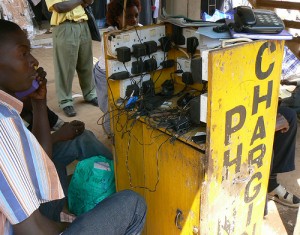Over the past months Global Voices has been engaged in researching and writing about ICT for development supported by Harvard's Berkman Center for Internet & Society and Canada's International Development Research Centre (IDRC). The challenge was to find out what was being said about ICT4D in global blogs and citizen media. We wanted to see what was being said beyond the halls of science, by practitioners in their own words.
We've collected our findings on a Future of ICT for Development special coverage page.
So what's being said?
After several months of dedicated analysis and writing about how ICT for development is covered on the web, here are some thoughts about the online availability of information about ICT4D – from academic articles, to conversation, commentary, and citizen media reflections on what works, what’s difficult and what is worth sharing.
It has been six years since the IDRC and Harvard held their first groundbreaking forum on ICTs and poverty. Since then there have been a great many zeros and ones spilled about practice and scholarship of ICT4D online. Much of this takes the form of research papers, books, and presentations produced by scholars or practitioners affiliated with institutions and nonprofit organizations.
It is, however, relatively more difficult to find blogs and citizen media content from unaffiliated individuals, and from those who experience the benefits, and sometimes challenges of internet technologies in developing-world contexts. While there are scattered discussions and commentaries, sustained, community-driven dialogue is not easy to find. This is perhaps not surprising, given the often complex and technical nature of the field.
There has been tremendous improvements in internet access and explosive growth of cell phones in developing world, as Matthew Smith outlines in his essay for IDRC/Harvard’s latest conference, Communication and Human Development: The Freedom Connection? in September 2009.
However, GV’s research (led by Aparna Ray and John Liebhardt) has found ambiguous evidence of online discussion of these themes that advances beyond well-worn anecdotes of fishermen with mobile phones. Those discussions surely exist, if not online; a look at the Manthan Awards in South Asia, for example, gives us a window into communities of practitioners in this field, and the focus of their work.
In general, we observed that there are several categories of people writing online about ICT4D:
- People who both understand grassroots development needs and are proficient in ICT. A very small percentage of online writers fall in this category. These people have the skills to develop tools/ techniques, speak the language of ICT4D, and are able to get exposure for their projects.
- Academics who are interested in the field. They are able to develop concepts in ICT4D, and mostly run small research projects to prove/ disprove their hypotheses, build concepts, and make predictions. There is a lot of energy here – perhaps why we saw so many research papers in our web searches. These people explore and predict trends, but are not often in contact with grassroots folks, and rarely implement projects.
- Everyone else either comes from the ICT community, and open to designing tools for development/ social projects, or people working in the development sector who need ICT solutions but have relatively low/ no knowledge of ICT. These two sets of people do not usually speak the same language.
Broadly speaking, many development experts seem hesitant to learn technical skills and languages. They may want a ICT solutions, but there are numerous obstacles to engagement, including expertise, time, resources, and organizational culture. Hence ICT experts sense that development practitioners are rarely clear about helpful solutions.
Likewise, ICT tool developers may not involve development communities in the need analysis/ development phase, producing many solutions that are top-down, and without user support.
Solutions and strategies:
ICT4D is a vibrant theme, but also quite complex, and with little awareness outside of specialist communities. Our first months of coverage have captured some of the best of existing citizen media writing. A next step would be to fill the gaps in coverage and language that we found. Some approaches:
Continued engagement: Much more can be written, with a focus on clarifying who the audiences are for content.
Popularizing complex ideas: much of the content of the GV posts is news for those who are not in the ICT space; for ICT experts, it has less to offer. How stories are reported is key. Strategies include:
- Conducting interviews with experts and practitioners to simplify language and concepts for target audiences.
- Finding a common language and platform for dialogue among people both in grassroots development and in ICT technology development.
- Including writers from different perspectives and parts of the world.
- Highlighting the work of interesting ICT projects.
- Focusing on user experience and feedback.









11 comments
Ref This is an ongoing conversation, and we’ll be writing more in the coming weeks, so we welcome your comments and insights. If you’ve got suggestions for places to find conversations online that we haven’t covered, we’d appreciate the links.
I would like to introduce the dadamac community http://www.dadamac.net/about and the blogs at http://www.dadamac.net. Our ICT4D approach is largely concerned with effective collaboration between “people at the grass roots” and “outsiders” thanks to the Internet. We believe effective ICT4D will be about long-term comparatively low-visibility high-trust inter-personal collaborations (ie the opposite of short-term high-visibility good-photo-opportunity top-down projects.)
We know ICT can enable effective two-way communication between people who previously could only collaborate face to face – but now can work at a distance as in the blog “Photo feedback loop” http://www.dadamac.net/blog/20100209/photo-feedback-loop. We are working to make that feedback loop increasingly effective and increasingly available to others.
We welcome this opportunity to be more closely connected with Global Voices.